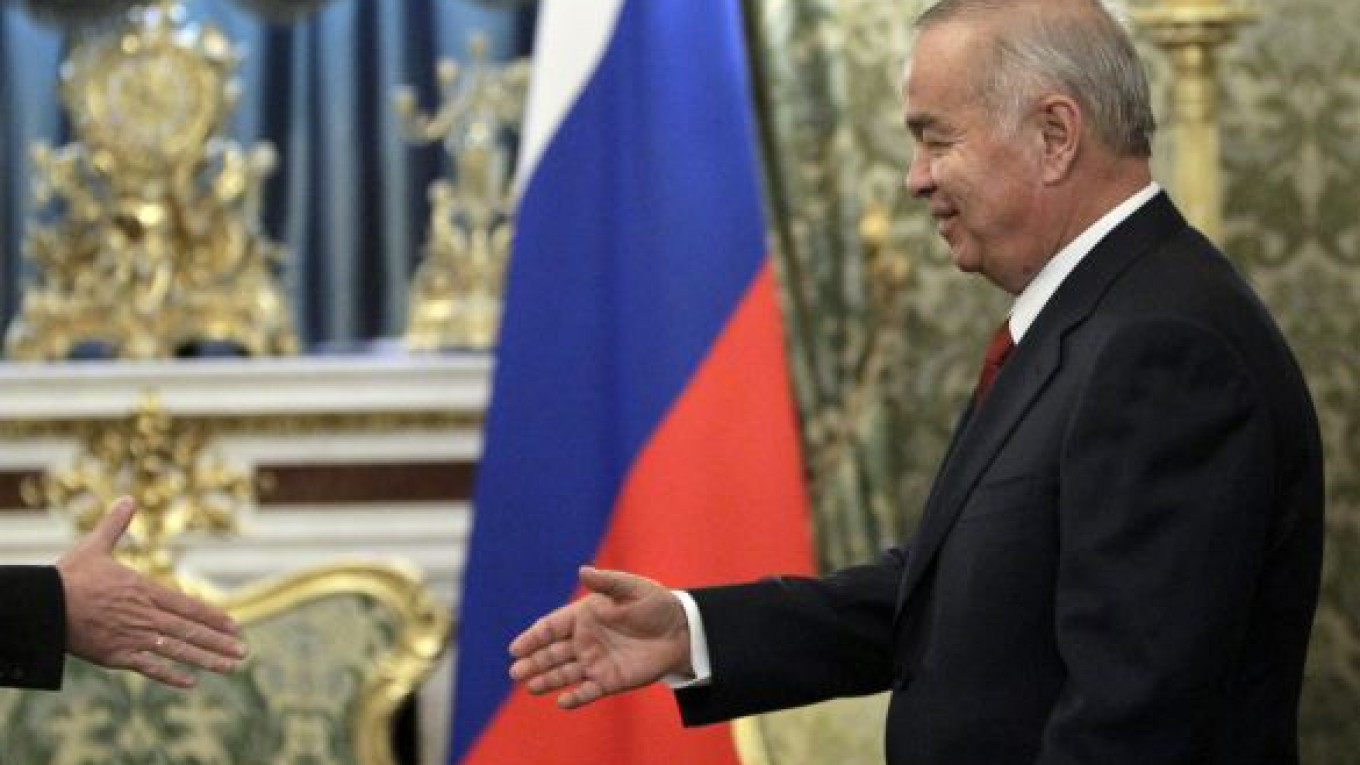Uzbek President Islam Karimov said Tuesday that the revolt in Kyrgyzstan would not be copied in his nation, which he has ruled with an iron fist for more than two decades.
Kyrgyz President Kurmanbek Bakiyev was toppled this month in an uprising against his five-year rule that has raised fears of turmoil in Central Asia.
Karimov warned that the Kyrgyz revolt, just five years after Bakiyev led protests that ousted the country's first post-Soviet ruler, Askar Akayev, had created a dangerous precedent.
"There is a rather serious danger that what is going on today in Kyrgyzstan, these processes, will take on a permanent character," Karimov said after talks in the Kremlin with President Dmitry Medvedev.
"In 2005, when all this happened, there was an infectious precedent, and it creates the illusion that it is very simple to overthrow any legal form of leadership or government," he said.
In May 2005, just two months after Bakiyev took power in Bishkek, Uzbek troops fired on protesters in the eastern city of Andijan, killing hundreds.
Karimov also lashed out at Russian newspaper reports that the unrest in Kyrgyzstan had concerned regional leaders.
"I read that the leaders of neighboring states are horrified and that the populations are delighted about the freedom-loving Kyrgyz people," Karimov said.
"Take it fr om me: In Uzbekistan, no one is delightedly following the actions of the freedom-loving Kyrgyz people. You can take my word for that," he said.
Karimov, who turned 72 on Jan. 30, is Central Asia's oldest incumbent ruler, and many analysts say the country of 27 million could be thrown into turmoil when Karimov steps down or dies.
Bakiyev, meanwhile, is in Belarus after leaving Kyrgyzstan for Kazakhstan last week, Belarussian President Alexander Lukashenko said Tuesday.
Lukashenko, who said Sunday that Bakiyev would be welcome in his country, told the parliament that he had arranged for Bakiyev to come to Minsk.
"President Bakiyev and his family are in Minsk under the protection of our state and me personally," Lukashenko said in televised remarks, adding that his guests were undergoing medical checkups.
In Bishkek, meanwhile, Kyrgyzstan's interim rulers sent troops on Tuesday to quell ethnic violence that has threatened their fragile grip on the country.
Defiant Bakiyev loyalists in the south and lawlessness on the fringes of Bishkek are challenging efforts to restore order.
In a show of strength, the government deployed 300 troops and police to intercept a crowd of several hundred men looting and trying to seize land belonging to Meskhetian Turks and Russians on the outskirts of Bishkek.
The clashes, in which five people died on Monday, have raised the specter of ethnic violence.
One villager in Mayevka, the scene of the worst attacks, pointed to bloodstains on the ground where a Turk was killed trying to defend his property against 100 Kyrgyz attackers.
"Everyone ran away but he put up resistance. So they stabbed him to death with knives and hayforks," said Alik Aliyev, a neighbor and also an ethnic Turk.
Kyrgyzstan's Meskhetian Turks are originally from Georgia but were deported to Central Asia by Soviet leader Josef Stalin.
Continued instability in Kyrgyzstan is a worry for Russia and the United States, which earlier curtailed operations at its Kyrgyz military air base supplying operations in Afghanistan.
Medvedev on Tuesday ordered the Defense Ministry to ensure the safety of Russians in Kyrgyzstan, Interfax reported.
It was not immediately clear what measures Russia, which has a military base in Kyrgyzstan, would use to ensure the safety of Russians.
In the lush, hilly outskirts of Bishkek, a military helicopter roared low overhead as troops confronted the rioters, who dispersed into nearby villages after an hourlong standoff.
Scenes of lawlessness persisted in Bishkek, the capital, with hundreds of vigilantes gathering on the main city square to organize a resistance movement against looters.
Witnesses said marauding crowds were spotted in various parts of Bishkek.
Many villagers had fled their homes Monday night to escape the violence. Locals said attackers were targeting Turkish and Russian homes because they are seen as being wealthier.
In the morning, smoldering rubble and smoke-blackened huts lined the potholed streets of the Mayevka suburbs, as villagers trickled back to pick through the rubble of their ruined homes.
The new authorities have pledged to quickly restore order, initiate democratic reforms and hold free parliamentary and presidential elections in September or October.
But they face tough resistance in Jalal-Abad, a southern city in Bakiyev's tribal heartland, wh ere Bakiyev loyalists have effectively seized power and installed a pro-Bakiyev governor.
The Organization for Security and Cooperation in Europe, which helped mediate Bakiyev's departure to Kazakhstan last week, urged Kyrgyzstan's interim leaders to act fast to enforce the rule of law and address urgent social and economic problems.
(Reuters, AP)
A Message from The Moscow Times:
Dear readers,
We are facing unprecedented challenges. Russia's Prosecutor General's Office has designated The Moscow Times as an "undesirable" organization, criminalizing our work and putting our staff at risk of prosecution. This follows our earlier unjust labeling as a "foreign agent."
These actions are direct attempts to silence independent journalism in Russia. The authorities claim our work "discredits the decisions of the Russian leadership." We see things differently: we strive to provide accurate, unbiased reporting on Russia.
We, the journalists of The Moscow Times, refuse to be silenced. But to continue our work, we need your help.
Your support, no matter how small, makes a world of difference. If you can, please support us monthly starting from just $2. It's quick to set up, and every contribution makes a significant impact.
By supporting The Moscow Times, you're defending open, independent journalism in the face of repression. Thank you for standing with us.
Remind me later.


